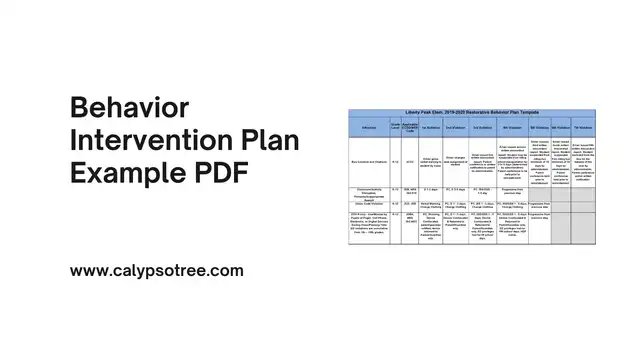An IT professionals job description includes many important tasks. IT professionals are vital for modern businesses. They make sure technology systems work well and help employees with technical problems. This guide will explain the roles, skills, and future trends in the IT profession.
What is IT Professionals
IT professionals are the backbone of modern businesses. They ensure that technology systems run smoothly and efficiently. This job description covers IT professionals’ various roles and responsibilities, including the skills and qualifications required.
Primary Responsibilities of IT Professionals
Managing IT Systems:
IT professionals take care of the company’s IT systems. This includes computers, software, and networks. They make sure everything is up-to-date and working well. For example, they update software or fix network problems.
Technical Support:
Helping others with technical problems is a big part of an IT professional’s job. They solve issues like a computer that won’t start or a printer that isn’t working. This support helps employees work without any interruptions.
Data Security:
IT professionals keep the company’s data safe. They set up firewalls, install antivirus software, and watch for security threats. This is very important to protect sensitive information from hackers.
Network Management:
IT professionals manage the company’s network. They make sure the network is reliable and runs smoothly. This includes setting up and maintaining local and wide area networks.
Software Development and Maintenance:
Some IT professionals develop and maintain software. They might create custom software for the company or update existing programs to meet the company’s needs.
System Integration:
Making sure different IT systems work well together is another important job. IT professionals connect various systems so they can communicate and function as one.
Database Management:
IT professionals often manage databases. They make sure data is stored securely and can be accessed easily. They might work closely with database administrators to keep these systems running smoothly.
Cloud Services Management:
With more companies using cloud services, IT professionals manage cloud-based applications and storage. This includes setting up cloud services, ensuring they are secure, and managing who can access them.
Backup and Recovery:
IT professionals make plans to back up data regularly. This means creating copies of data and storing them safely. If there is a system failure or data loss, they can quickly restore the data from these backups.
Skills Required to Become a Successful IT Professional
Technical Skills:
IT professionals need strong technical skills. They must understand various operating systems, programming languages, and software applications. Knowledge of SQL, a language used to manage databases, is also crucial. This is like knowing the rules of a game and the layout of the playing field.
Analytical and Problem-Solving Skills:
IT professionals must be good at analyzing problems and finding solutions. They need to think critically and figure out why something isn’t working and how to fix it. It’s like being a detective solving a mystery.
Communication and Teamwork:
Good communication and teamwork are essential. IT professionals often work with other IT staff and non-technical employees. They need to explain technical details clearly and work well with others. Imagine teaching someone how to ride a bike – you need to be clear and patient.
Attention to Detail:
They must be meticulous when troubleshooting issues, managing data, and implementing security measures. Missing a small detail can lead to big problems.
Adaptability:
Technology is always changing, so IT professionals need to be adaptable. They must keep up with new technologies and be willing to learn new skills. This is like being ready to learn new rules in a constantly changing game.
Project Management:
IT professionals often manage projects, so they need good project management skills. This includes planning, executing, and overseeing projects to ensure they are completed on time and within budget.
Educational Qualifications for IT Professionals
Degrees in Computer Science or Information Technology:
Most IT professionals have degrees in computer science or IT. These programs teach the skills needed for the job.
Certifications:
Certifications from organizations like Cisco, Microsoft, or CompTIA can be very helpful. These certifications show that IT professionals have specific skills and knowledge. They often require passing exams to prove abilities.
On-the-Job Training:
Some skills are learned through on-the-job training. IT professionals might start in junior positions and learn from more experienced colleagues. This hands-on experience is valuable and helps them understand real-world problems and solutions.
Types of IT Professional Roles
Network Administrator:
Network administrators manage and maintain the company’s network. They ensure that the network is secure and running smoothly. This role involves setting up networks, troubleshooting issues, and ensuring network performance.
System Administrator:
System administrators manage the company’s computer systems. This includes servers, desktops, and other IT infrastructure. They ensure systems are updated, secure, and running efficiently.
Database Administrator:
Database administrators manage the company’s databases. They ensure data is stored securely and can be accessed easily. For more details, see Job Description for a Database Administrator.
Help Desk Technician:
Help desk technicians provide technical support to employees. They solve everyday technical problems and help employees with IT-related issues. This role is crucial for keeping the company’s IT systems running smoothly.
Software Developer:
Software developers create and maintain software applications. They might develop custom software for the company or work on existing programs. This role requires strong programming skills and creativity.
IT Security Specialist:
IT security specialists focus on protecting the company’s IT systems and data. They set up security measures, monitor for threats, and respond to security incidents. This role is essential for keeping the company’s data safe.
Cloud Architect:
Cloud architects design and manage cloud computing systems. They set up cloud services, ensure they are secure, and manage user access. This role is increasingly important as more companies move to cloud-based solutions.
Benefits of Hiring IT Professionals
Improved Efficiency:
IT professionals help the company run smoothly. They fix problems quickly so employees can work without interruptions. This makes everyone more productive.
Better Security:
IT professionals protect important data from cyber threats. They set up firewalls and use antivirus software to keep information safe. This reduces the risk of data breaches.
Cost Savings:
By managing IT systems well, IT professionals save the company money. They prevent costly downtimes and make sure the IT infrastructure is used efficiently.
Innovation:
IT professionals keep up with new technologies. They bring these innovations to the company, helping it stay competitive and up-to-date.
Support and Maintenance:
IT professionals provide essential support. They fix issues fast and keep systems running all the time. This support is crucial for the company’s operations.
Challenges Faced by IT Professionals
Rapid Technological Changes
Keeping Up:
Technology is always changing, and IT professionals must keep up with the latest advancements. This requires continuous learning and adapting to new tools and methods.
Continuous Learning:
IT professionals need to take courses, attend workshops, and read about new technologies. Staying updated is crucial for staying relevant in the field.
Security Threats
Constant Battle:
IT professionals constantly battle against security threats. Hackers are always finding new ways to breach systems, so IT professionals must stay updated with the latest security practices.
Staying Updated:
This means regularly updating software, installing security patches, and monitoring systems for unusual activity. It’s like being on constant watch to prevent intruders from breaking in.
System Downtime
Minimizing Disruptions:
System downtimes can be very disruptive. IT professionals must work quickly to fix issues and get systems back online. This requires good troubleshooting skills and the ability to stay calm under pressure.
Pressure to Perform:
The goal is to minimize downtime and keep everything running smoothly. IT professionals often work behind the scenes to prevent problems before they happen.
Balancing Innovation and Maintenance
Balancing Act:
IT professionals must balance working on new projects and maintaining existing systems. This means managing time effectively and prioritizing tasks.
Routine Maintenance:
While innovation is exciting, routine maintenance is essential for keeping systems reliable and efficient. It’s like keeping a car in good condition while also working on new upgrades.
IT Professionals’ Salary
Understanding Salary Estimates
IT professionals can earn good salaries. Here’s a look at what different sources say about how much they make.
Glassdoor:
According to Glassdoor, IT professionals in the United States can make between $99,000 and $180,000 per year. This shows that experienced IT professionals can earn high salaries.
ZipRecruiter:
ZipRecruiter gives hourly rates for IT professionals. They earn between $18 and $58 per hour. This means that even starting IT professionals can make a decent wage, and experienced ones can earn more.
Salary.com:
Salary.com says that IT professionals in the United States make between $70,000 and $110,000 per year. This is another good estimate for how much IT professionals can expect to earn.
Payscale:
Payscale offers a range from $44,000 to $110,000 per year for IT professionals in the United States. This range shows that entry-level IT jobs start lower, but there is potential for higher earnings with experience.
Tips for Aspiring IT Professionals
Continuous Learning
Stay Updated:
Always be learning. Take online courses and get certifications. Read about the latest technologies to keep your skills sharp.
Educational Resources:
Use free online tutorials and advanced certification programs. These resources help you stay ahead.
Networking
Build Connections:
Attend conferences, join forums, and participate in professional groups. This can lead to job opportunities and valuable advice.
Professional Organizations:
Join groups like the Association for Computing Machinery (ACM) or ISACA. These organizations help you connect with peers.
Practical Experience
Hands-On Practice:
Gain experience through internships and real-world projects. This helps build skills and provides insights into the job.
Internships:
Look for internships or entry-level positions. Learning by doing is one of the best ways to prepare for a career in IT.
Soft Skills Development
Communication and Teamwork:
These skills are essential for working well with others and solving problems.
Importance of Soft Skills:
Explaining technical issues clearly and working in a team is as important as technical skills. Practice these skills at every opportunity.
Tools and Technologies to Watch
- New Technologies: Discuss new and emerging tools that IT professionals should be aware of. Highlight their features and benefits.
- Staying Ahead: Keeping up with the latest tools can give IT professionals a competitive edge.
- Tool Comparisons: Compare popular IT tools and technologies. Discuss their pros and cons to help professionals choose the best tools for their needs.
- Informed Decisions: Making informed decisions about tools and technologies is crucial for effective IT management.
Sample IT Professionals Job Description
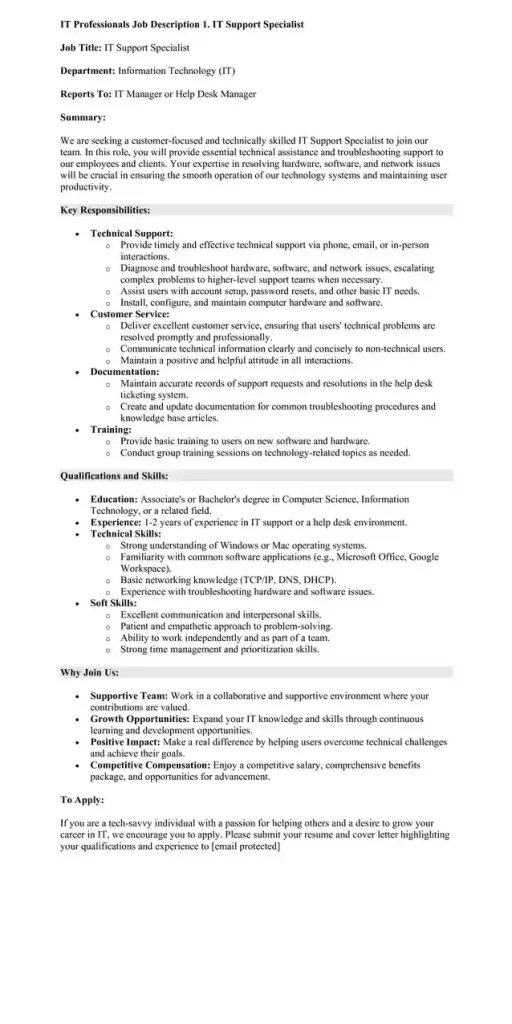
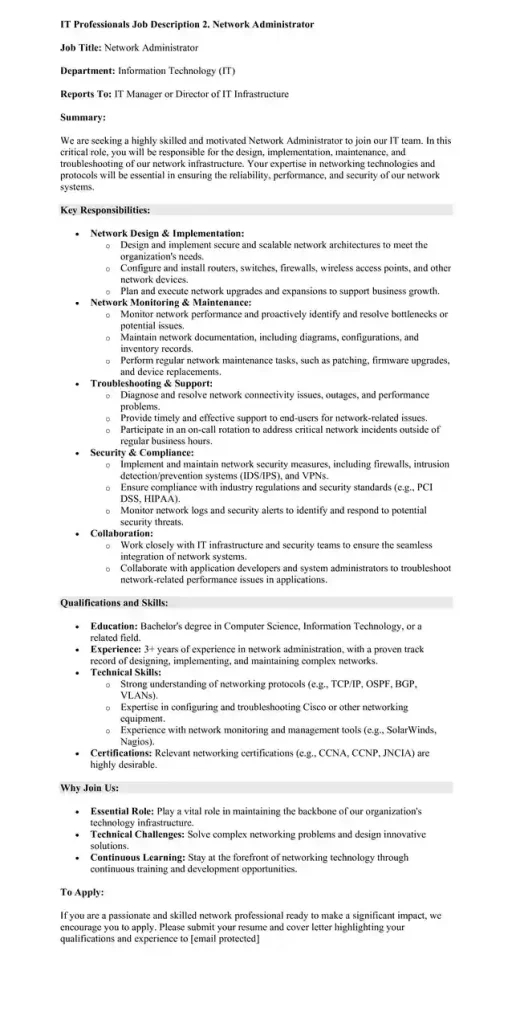
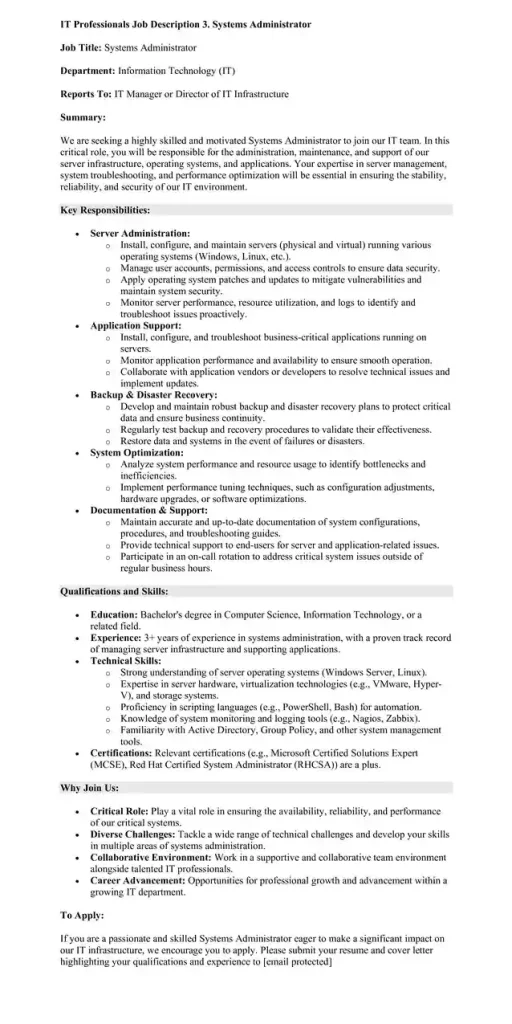
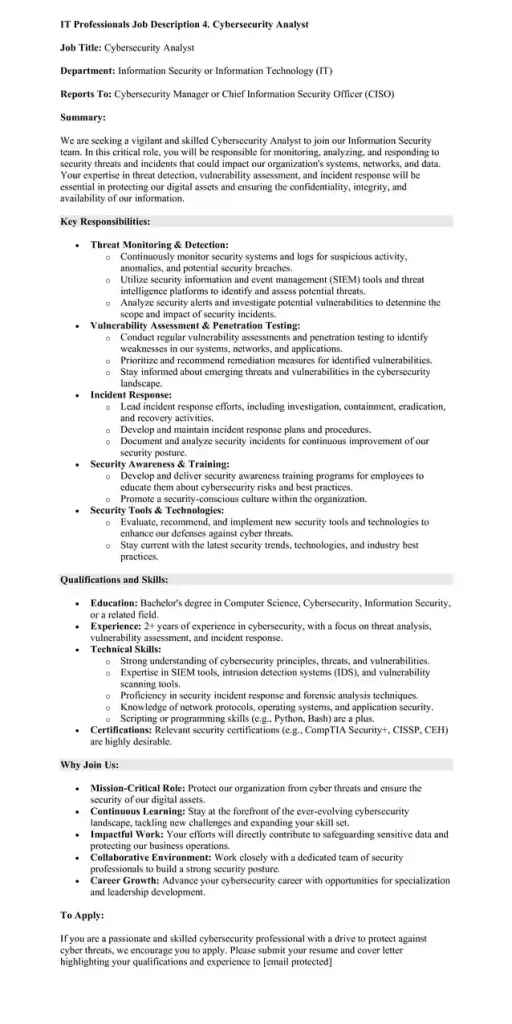
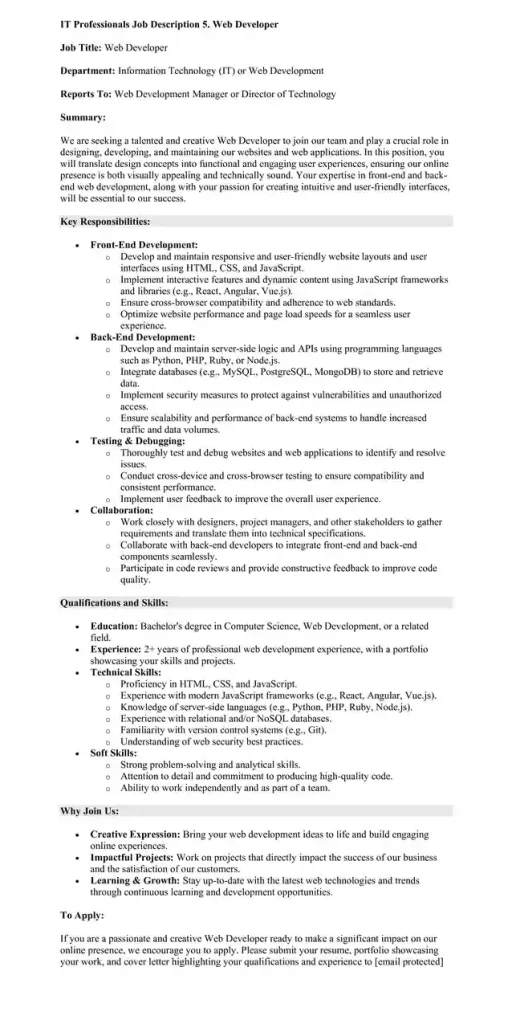
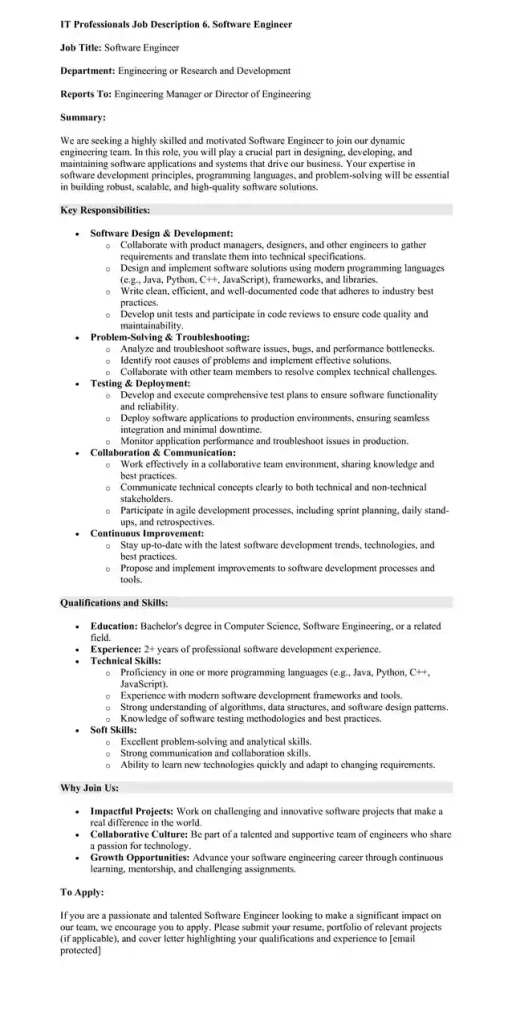
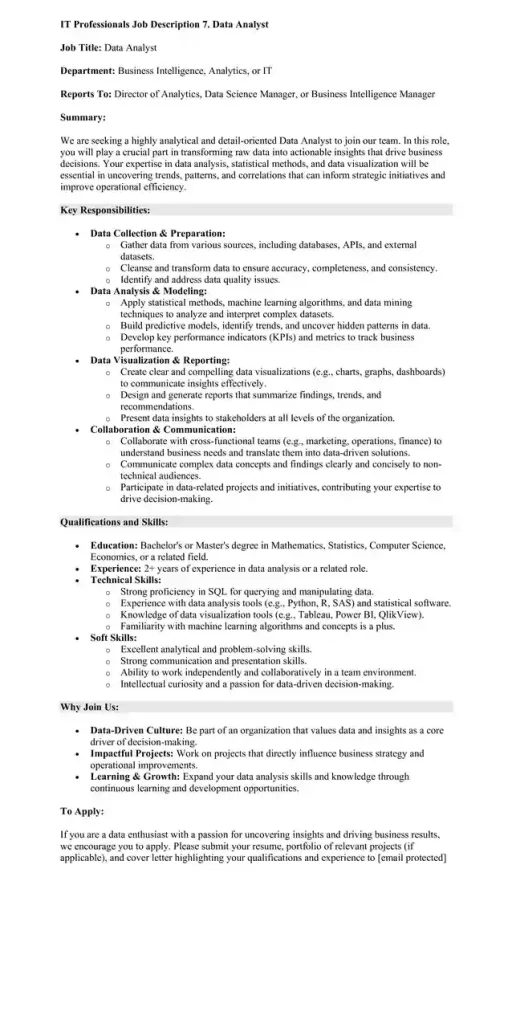
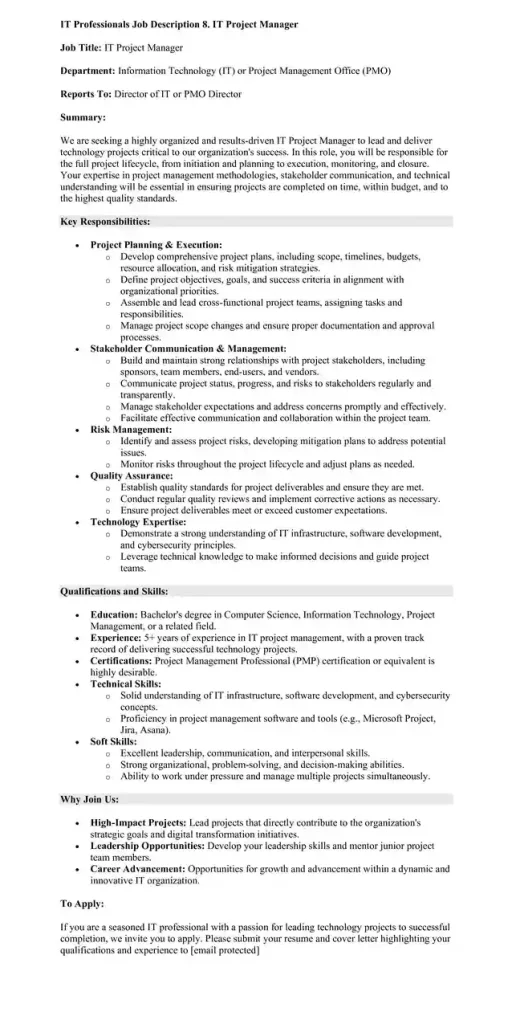
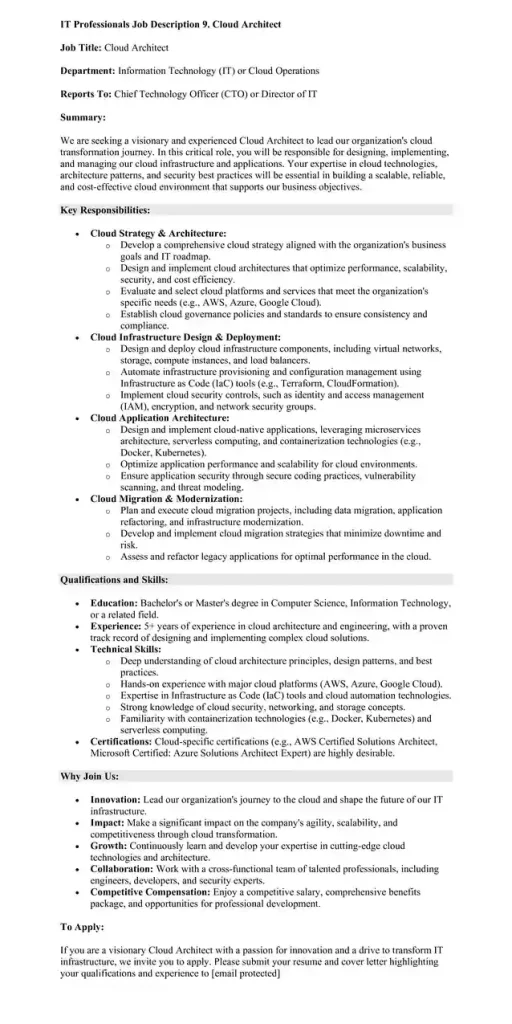
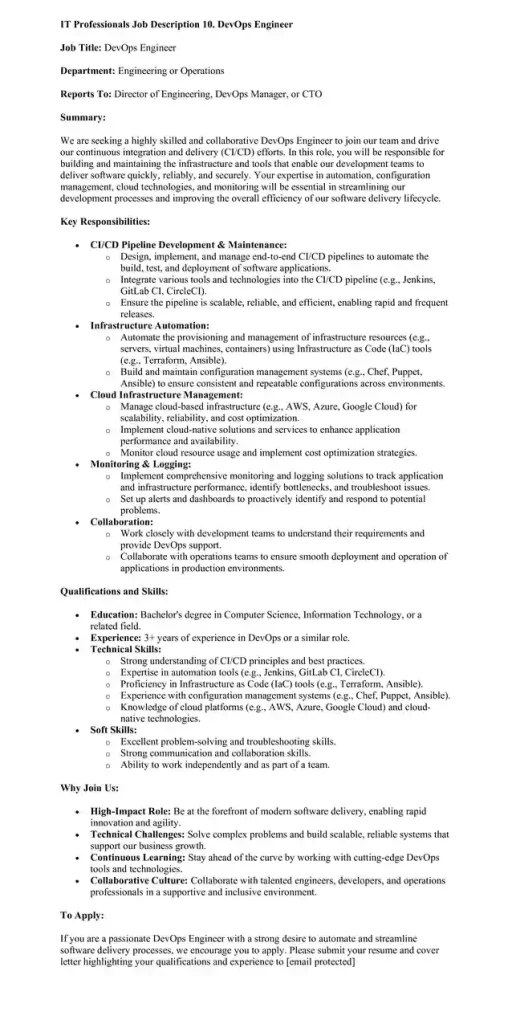
Future Trends in IT Professions
Artificial Intelligence and Machine Learning
Transforming IT Roles:
Artificial Intelligence (AI) and Machine Learning (ML) are changing the way IT professionals work. AI and ML can automate routine tasks, which saves time and reduces errors. For example, AI can automatically sort emails or schedule meetings. This allows IT professionals to focus on more complex tasks.
Enhancing Data Analysis:
AI and ML are also making data analysis faster and more accurate. They can quickly analyze large amounts of data and find patterns that humans might miss. This helps businesses make better decisions based on real data. For example, AI can analyze customer behavior and suggest ways to improve sales.
Cybersecurity
Increasing Importance:
Cybersecurity is more important than ever. As businesses rely more on technology, the risk of cyber attacks increases. IT professionals need to protect data and systems from these threats.
Growing Need for Skilled Professionals:
There is a growing need for IT professionals with strong cybersecurity skills. They must know how to set up firewalls, use encryption, and monitor for suspicious activity. Cybersecurity experts are like the guards who protect a fortress, keeping the bad guys out.
Cloud Computing
Changing the IT Landscape:
Cloud computing is changing how IT systems are managed. Instead of storing data on local servers, businesses use cloud services like AWS, Google Cloud, and Microsoft Azure. This makes it easier to access data from anywhere and reduces the need for physical hardware.
Skills Needed:
IT professionals need to know how to manage cloud services. This includes setting up cloud storage, managing user access, and ensuring data security. Cloud computing skills are now essential for many IT jobs.
Internet of Things (IoT)
Expanding Reach:
The Internet of Things (IoT) is connecting more devices to the internet, from smart home devices to industrial machines. This expansion is creating new opportunities for IT professionals in various industries, like manufacturing and healthcare.
New Opportunities:
IT professionals working with IoT need to manage and secure these connected devices. They also analyze data from IoT devices to improve efficiency and performance. This is like managing a network of sensors that provide valuable information.
Conclusion
Understanding the IT Professionals Job Description shows how important they are to businesses. IT professionals manage systems, help with technical support, and keep data safe.

Alexander is a skilled HR expert who writes clear and compelling job descriptions. He has spent over 15 years in the HR field, helping companies find and keep the best employees. With a degree in Human Resources Management from the University of Chicago, he has the knowledge to back up his experience.







